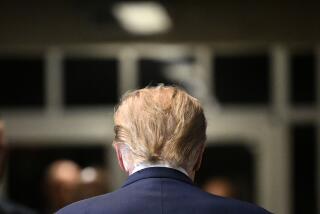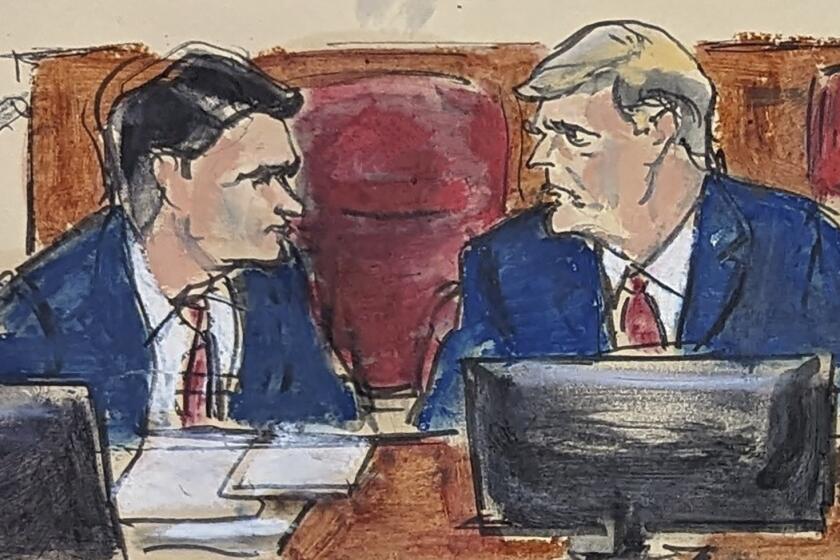U.N. Pick Called Bully Who Abused His Power
The State Department’s former intelligence chief testified Tuesday that John R. Bolton was a “serial abuser” of underlings who tried to remove an intelligence analyst who disagreed with him and was “a quintessential kiss-up, kick-down sort of guy.”
But it appeared that the testimony of Carl W. Ford Jr., former assistant secretary of State for intelligence and research, before the Senate Foreign Relations Committee had not changed any votes on Bolton’s nomination to be U.S. ambassador to the United Nations. Republicans control the panel 10 to 8 and were seen as likely to approve him.
President Bush’s choice of Bolton has alarmed Senate Democrats, who view the nominee as a foe of the U.N. and as a symbol of failed U.S. intelligence practices.
An outspoken conservative who has been a harsh critic of the U.N., Bolton testified Monday that if confirmed he would carry out the president’s policies and work closely with allies at the U.N. while trying to reform the world body.
The testimony by Ford, who said he was a conservative Republican, was solicited by Democrats to impeach Bolton’s character.
Sen. Lincoln Chafee of Rhode Island, the only committee Republican known to be wavering, was still inclined to vote in favor of Bolton, Chafee spokesman Stephen Hourahan said Tuesday. Chafee had “not made up his mind” and was “going to spend some time reading written testimony” from other witnesses, Hourahan said.
Democrats signaled that they might try to subpoena more witnesses -- who are still in the administration and may not testify voluntarily -- to buttress their arguments that Bolton retaliated against analysts who would not change their assessments.
A committee vote could come Thursday or by early next week, possibly sending the nomination to the Senate floor, where Bolton is likely to win confirmation on a party-line vote. Democrats could mount a filibuster to block Bolton’s nomination, but they did not indicate Tuesday that they planned to do so.
Ford testified on the second day of hearings on the nomination of Bolton, 56, who has served since 2001 as undersecretary of State for arms control and international security. Ford retired in October 2003 after more than 30 years in the Army, the Defense Intelligence Agency, the CIA, the Pentagon and the State Department’s intelligence bureau.
Describing himself as an “enthusiastic supporter” of Bush and his policies, and as a fan of Vice President Dick Cheney, Ford said he felt awkward testifying against the president’s nominee. He said he agreed to do so only after committee Democrats suggested that they might subpoena him.
But Ford went on to denounce Bolton’s treatment of subordinates.
“There are a lot of screamers in government,” Ford said. “I’ve never seen anyone like Secretary Bolton ... in terms of how he abuses little people.”
Ford acknowledged that he might not be objective about Bolton. But he denied suggestions by Republican senators that his testimony might stem from personal animosity. Ford said he found Bolton’s treatment of others “professionally unacceptable.”
“I’m as conservative as John Bolton,” Ford said, but added: “It is out of bounds in the federal bureaucracy to let a bully run wild on the people.”
Democrats praised Ford for coming forward, but committee Republicans questioned the intelligence official’s allegations as they moved to shore up Bolton’s nomination.
Sen. Mel Martinez (R-Fla.) said despite the sweeping condemnation, Ford had direct knowledge of only one incident.
Ford agreed that his personal experience with Bolton was limited to one episode. In that incident, he said Bolton castigated Christian Westermann, an intelligence analyst who worked for Ford. Westermann “had the temerity” to tell Bolton’s staff that he could not approve language about Cuba’s biological weapons program that Bolton wanted to include in a speech, Ford said.
Sen. Joseph R. Biden Jr. (D-Del.) said the committee had interviewed four witnesses who corroborated Ford’s story. Democrats said the witnesses also described a second incident in which Bolton sought to have the national intelligence officer for Latin America removed from his job after a conflict about intelligence.
When confronted by Democrats with the accounts, Bolton testified Monday that he told the analysts’ superiors in both cases that he had lost confidence and trust in the men and thought they should be reassigned. Bolton insisted that he did not pressure the analysts to change their views and said the problems were based on their professional conduct.
In the case of Westermann, Bolton said the analyst had gone behind his back by sending an e-mail to a CIA colleague saying that Bolton was seeking clearance to use the Cuba language in a speech.
Westermann wrote that he thought the language in the proposed speech went too far in describing Cuba as having an offensive biological weapons program, and he sent a copy of the e-mail to Bolton’s chief of staff. In the end, the CIA ruled that Bolton had to tone down his remarks.
Westermann, who has not testified, told committee staffers in an interview that Bolton had summoned him to his office and had delivered a finger-pointing, red-faced tirade, then kicked him out of his office.
Ford testified that word of the confrontation “spread like wildfire” through the intelligence community, causing analysts to fear what would happen to them if their assessments ran afoul of administration politics.
Ford was out of the office on the day of the confrontation between Bolton and Westermann. Ford’s deputy, Thomas Fingar, trying to defuse the situation, sent Bolton an e-mail saying that Westermann’s behavior had been “inappropriate,” that “we screwed up” and that “it won’t happen again.”
Fingar told committee staff members that he understood Bolton was angry and that he sent the e-mail to placate him. Bolton testified that as far as he was concerned, the matter ended there.
“I shrugged my shoulders and I moved on,” Bolton said Monday.
Ford contradicted that account, saying Bolton had asked him to remove Westermann from assignments dealing with issues of biological weapons.
In an argument in a State Department hallway, Ford refused to replace the analyst, whose job he said was to “speak truth to power.”
Ford said he used the incident in training other analysts how to present policy makers with intelligence estimates that they did not want to hear.
Chafee noted that Westermann and the other analyst who had angered Bolton kept their jobs.
The State Department continued to defend Bolton.
Asked for Bolton’s response to Ford’s charges, State Department spokesman Richard Boucher said: “I don’t think anything more needs to be said. The president nominated him and has confidence that he will do an excellent job for us at the U.N., and we believe he should be confirmed.”
Committee Chairman Richard G. Lugar (R-Ind.) said he would vote for Bolton.
Although the demeanor of an official is important, he said, “the paramount issue as I see it is the reform of the United Nations.”
“This is not meant to excuse any particular conduct,” Lugar said.
Sen. Barbara Boxer (D-Calif.) suggested that Bolton needed anger management training, and other Democrats said the incidents demonstrated Bolton’s unsuitability for the U.N. post.
Biden said Bolton would be serving in the U.N. at a time when the objectivity and accuracy of U.S. intelligence was doubted around the world, and while his own credibility on intelligence matters was under fire.
“This is the man who might have to take the case to the world on [North] Korea and Iran based on intelligence,” Biden said. “I believe this is damaging to our national interest.”
More to Read
Get the L.A. Times Politics newsletter
Deeply reported insights into legislation, politics and policy from Sacramento, Washington and beyond. In your inbox three times per week.
You may occasionally receive promotional content from the Los Angeles Times.






